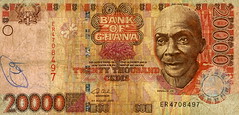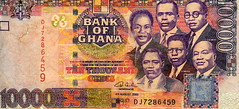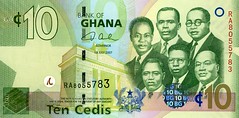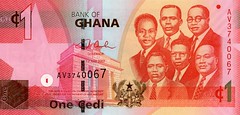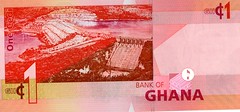A Debt Foretold
Asked if she would use a credit card if one were given to her, Ms. Zhang looked confounded. "What's a credit card?" she asked, adding, "We have everything we need."Indeed, I ask. Indeed. Ms. Zhang has vocalized the existential question of our age. What's a credit card?
— China's Economy, in Need of Jump Start, Waits for Citizens' Fists to Loosen
Everyone is asking similar questions these days. "What's a bank?", for example, is something that markets the world over are pondering. We're finding out that there are many things that are bank-like entities — from insurance companies through mortgage companies to even car companies, and others, nominally called banks, that had very odd ideas about what a bank was actually supposed to be or do. But I digress, let's stick to the matter at hand: what's a credit card?
Well the credit crunch hit home in a minor way last week. The message, delivered in a plain white envelope, was resonant in its simplicity:
Dear Mr O. AmaahWe are writing to you because we noticed that this credit card account hasn't been used for at least [redacted] months. We believe this may indicate that the account no longer meets your financial needs. With this in mind, the account has been closed.
[redacted closing pleasanteries]
So there you have it, ever so pithy. It kicked the bucket; there's one less credit card in the world today. A little piece of plastic was duly snipped, shredded, and recycled. And that was that, you might say. Still, there's a tale lurking behind that note, a petit divertissement perhaps, an object lesson about the current global reassessment of risk, or if you are so inclined, a parable about the meaning of credit. Consider the following credit card toli a chronicle of a debt foretold...
My introduction to Generation Debt (USA edition) was with a First USA credit card that I signed up for sometime in 1994 in order to finance a conference that a bunch of African students decided to put on that year. Not being favoured sons and daughters of Harvard, donors were not being forthcoming with spare change to help our efforts. But we were bloody minded enough to want to put Africa on the university's agenda, for a weekend at least — we knew our limits. So I picked up the three credit card applications that had been crowding my university mailbox, filled and returned them in their glorious postage-paid envelopes.
I have to admit, I was shocked when a sleek credit card duly arrived in the mail a week later. I was doubly shocked when I saw the number of digits in the credit line assigned to me. I still can't believe that a bank would extend almost $12,000 of credit to a mere African student who was earning $8.50 an hour working weekends as a dishwasher in the Harvard dining halls. Well, this meant that the show would go on, my $300 bank balance be damned. I dug this plastic exemplar of American bravado. Sidenote: one of the other applications had been promptly rejected, and after a longer period, the third was approved (with a credit line of $500).
Incidentally the first purchase made on this card — and the card's claim to fame, was a plane ticket for Ellen Johnson-Sirleaf to bring her to the conference. At that time she was a humble bureaucrat at the United Nations Development Program who, if I remember correctly, had initially suggested that she would even contemplate driving up from DC if we could find someone to car-pool with her... You'll recall that Liberia and Sierra Leone circa 1994 was prime warlord running riot material. She, in contrast, simply wanted to talk to the students. How refreshing.
Anyway, the eventual budget for the conference was around $22,000 of which approximately $15,000 was put on credit cards that were bestowed on yours truly over the next two months.
Now I see you shaking your head. I understand. It's OK, go ahead, shake your head, titter away. I can handle a lot of head shaking, rolling of eyes and the like. I certainly am shaking my head as I remember the things I charged on that card. You see, thrift runs deep in my family. Further, there's a certain conservative streak and reputation that is very much belied by this, my first encounter with a credit card. In mitigation perhaps, I'd note that I was just a year past the sophomore stage so you could place this anecdote under the banner of youthful indiscretion.
Returning to our original question — remember we're trying to clarify things for Ms. Zhang — what can we say so far?
Well a credit card is claimed to have something to do with meeting financial needs — that is what my credit card company suggested even as they terminated our dalliance.
The anecdotal evidence also shows that a credit card is something that changes one's relationship to risk, and indeed risk assessment.
A further reality illustrated here is that a credit card is something that allows sophomoric impulses to move beyond mere bravado to full-blown fiscal train wreck, all within a 25 day (or 20 day) billing cycle - for these things can change at little notice per the small print.
It turns out that there's nothing like having $15,000 bills to concentrate the mind - well at least to concentrate my Ghanaian student mind. It also turns out that, statistically speaking, credit card debt doesn't concentrate the minds of most Americans - students or otherwise. It must be a cultural thing. It is confounding, isn't it? A credit card is a puzzle.
Suffice to say that I sweated a lot for the next few months as I applied to various funding sources to try to get reimbursement so that I could pay off my credit card bills. That $15 minimum payment that was cheerily suggested to me seemed a little out of proportion to the actual bills in question, on the order of a thousand times the amount of said bills. A credit card is a hassle.
If you were in Cambridge in those heady months and had even a faint whiff of money about you, you would have made my acquaintance. The idea was that I'd beg, steal or borrow to repay this debt. I visited more foundations, Harvard-affiliated or not, wrote more letters, made more phone calls, appeared in more student council meetings or board meetings, than I care to remember. I discovered reserves of argumentation and negotiation skills that I never knew I possessed. Some looked for polish in the presentation and others wanted you to dance for the money. I had no shame, and was chameleon-like in my affectations. For a surprisingly large number of organizations, it appeared that it paid to look very skinny, malnourished, child-like and/or poor - there's a certain image of Africa that loosens wallets. Normalcy wasn't a feature that they cared for. Well, I obliged. I remember someone wondering aloud why we needed to bring all these mid-level African professionals (Johnson-Sirleaf, Djibril Diallo etc.) to the conference when an expert like Samuel Huntington was available (and local). I kept my mouth shut. A credit card is a hustle.
I learned a lot in those days about money, power, time, and especially about debt. On the question of time, I learned one of Einstein's dreams about the perception of time: there's that notion of time dilation as evidenced by the interval between when someone says they will give you money and the actual moment when you receive said money. A credit card is an alarm clock of sorts.
There were many lessons learned, perhaps too numerous to enumerate here. The American facility and close companionship with debt will forever remain a source of fascination to me.
My sweat paid off, money trickled in, the conference went on and I managed to pay off those initial credit card bills on time. A couple of months later, I got another letter from First USA: the credit card company duly increased my credit limit to $15,000. A credit card is a dream.
When you read about the psychology of conmen, you'll find a lot about misdirection in language and verbal framing. They fact that they call it "credit card" is quite a tell when it is actually a "debt card". The verb credit has positive associations of honour and achievement that enable the crucial leap of faith. Truth in advertising, if you will. A credit card is a confidence game.
The Story of O
Having a long and hyphenated name, I was always wary about using my now dearly departed credit card - even as First USA's issues in the realm of e-commerce were being worked out. For one, my full name didn't fit in the required space on the card's front so the first part of my last name became the initial O, and a new identity was minted, Phoenix like. For fifteen years, an entire area of forest and countless trees have been sacrificed to the cause of junk mail offers to that guy with the O initial. I tell you, Mr O. Amaah has been positively deluged by marketing offers after First USA promptly sold my details to its marketing partners. A credit card is an alter ego.
Returning to our story. In time, First USA was bought up by Bank One which was bought up by Chase Manhattan bank (later renamed Chase), which was bought up by JP Morgan to become JP Morgan Chase. The card name changed accordingly. A credit card is a chameleon.
When I lost my wallet and bag a few years ago, and tried to cancel the card, I had to go through a whole rigmarole with customer service trying to determine what the name of the card was. I always remembered it as my First USA card but there were at least four different entries in their records. Who knew? A credit card is a complication.
I am not one for debt. I had this card for almost 15 years but I found myself preferring the second card which, you'll recall, came with a lower credit line and on which my full name could be printed on its front. I only use credit cards as a convenience and am one of those termed deadbeats by the credit card industry, ergo one who pays his bills in full.
Truth be told, I stopped using it because of fickle and aesthetic reasons. I didn't want to pretend to be Mr O. Amaah any longer. I was skeptical of that entire identity conjured up out of missing pixels and thin air. A credit card is a sleight of hand.
Still, I kept the card around for sentimental reasons – you always remember your first credit card, your lost virginity in commercial debt. It was the prodigal card, or perhaps the card that the builder refused in biblical terms. Well no longer. My credit card is dead.
JP Morgan Chase received a bailout in the form of a $25 billion equity injection from the United States Treasury under the authority of the TARP legislation. Presumably as the company absorbs its Bear Stearns and Washington Mutual acquisitions, the bean counters have decided that hoarding cash is the name of the game. Risk managers the world over are doing much the same thing – that's why they call it a credit crunch, innit? They no longer relish the prospect of yours truly being seized once again by a seminal lunacy and taking advantage of the now $23,000 credit line that they had since extended to him. Oh well, their loss.
I suspect it will take a few years for Mr O. Amaah to stop receiving junk mail. While I might (briefly) mourn my First USA card, I can't wait for my alter ego's disappearance. In the grand scheme of things, I'm doing fairly well in life. I have health and loving family and friends. I applaud those faceless credit assessors for cutting me off — even if abruptly and without notice. I'll echo the words of a confounded Chinese woman:
"What's a credit card?" Adding later, "We have everything we need".
A credit card is a debt foretold.
Light Reading
- Gabriel Garcia Marquez - Chronicle of a Death Foretold
The end was always certain but the story was worth telling. And re-reading, over and over again.
Credit in Film
One of my favourite films of the 1990s is the Dutch film Karakter (Character). It's a tale of Oedipus meets Inspector Javert with the prospect of bankruptcy looming and debtors' prison. A wonderful period thriller founded on the themes of identity and duty — the duty of repaying one's debt; that Dutch sense of rectitude.
Soundtrack for this note
Some music for the soul.
- The Streets - A Grand Don't Come For Free
An album length meditation on the small things and the daily hustle. Standouts include It Was Supposed To Be So Easy, Not Addicted and What Is He Thinking. Indeed. - Lizz Wright - Dreaming Wide Awake
The sophomore album in the form of the young lioness growling. Aural candy for the jazz vocal fiend. - Tom Scott - Today and Pete Rock & C.L. Smooth - They Reminisce Over You (T.R.O.Y)
The sinuous horns are duly credited to Tom Scott's brand of seventies' rare groove. They were sampled to great effect by the one and only Pete Rock who added glorious snare drums. Everything that is good about hip-hop can be found in that song.
Next: What is a bank?
Some further context
File under: credit, debt, bubble, USA, economics, risk, banking, finance, observation, culture, life, Observers are worried, Shell Game, toli